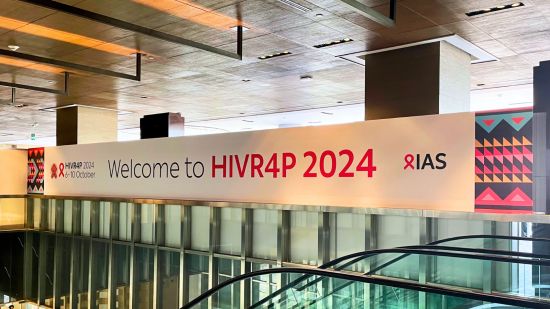|
PRESS RELEASE
October 18, 2024
IAVI reflects on the changing HIV prevention landscape at HIVR4P 2024
Cross-disciplinary conversations highlighted recent progress in HIV vaccine and antibody research, as well as the importance of choice and community collaboration when developing HIV prevention strategies.

On Oct. 10, the 2024 HIV Research for Prevention Conference (HIVR4P) concluded in Lima, Peru, with a clear call to action. Linda-Gail Bekker – conference co-chair; CEO, Desmond Tutu Health Foundation; and IAVI board member – exhorted attendees to “go off and prevent!” In the same session, Sharon Lewin, director, Peter Doherty Institute for Infection and Immunity, urged researchers to work across disciplines. “We need a vaccine, and we need a cure, and we can’t be deterred by the complexity of both challenges,” she said. While HIV prevention research has taken a large leap forward with the development of long-acting prevention options like lenacapavir, the need for an HIV vaccine and for cure research remains.
Organized by the International AIDS Society, HIVR4P is the only global scientific conference focused exclusively on the field of HIV prevention research. With over 1,300 participants in attendance, IAVI leaders enjoyed the opportunity to showcase our work and learn from peers across disciplines and continents.
Read on for session snapshots and key takeaways from this year’s HIVR4P.
HIV vaccine and antibody research
Advances in HIV vaccine and antibody development were clear highlights of the conference. This was especially evident during the opening plenary as Jeanne Marrazzo, director, National Institute of Allergy and Infectious Diseases (NIAID), reiterated the urgent need for an HIV vaccine, highlighting the importance of germline targeting as an approach.
Vincent Muturi-Kioi, HIV vaccine product development team lead, IAVI Africa, spoke on a variety of related topics throughout several high-profile sessions. He described the need – given the continuing burden of the HIV pandemic – to accelerate preclinical and clinical studies to enable iteration and development of a vaccination regimen. Muturi-Kioi also illustrated the potential of broadly neutralizing antibodies (bnAbs) for postnatal HIV prophylaxis in infants, noting that about 120,000 children acquired HIV in 2023.
In one plenary session, Eunice Nduati, research scientist, KEMRI – Wellcome Trust, traced the history of HIV vaccine development and focused on IAVI’s germline targeting strategy to elicit bnAbs. She described the promise of current research by IAVI and Scripps Research to elicit bnAbs for HIV prevention. IAVI believes this is the most promising HIV vaccine development effort ever taken, with additional clinical trial results from IAVI G002 and IAVI G003 forthcoming.
Community engagement
Early, meaningful, and collaborative community engagement was another theme of HIVR4P. Conversations about the critical role of community-engaged science in driving HIV prevention research, clinical trials, and access to interventions such as pre-exposure prophylaxis (PrEP) permeated the conference.
IAVI leaders were excited to lead and participate in multiple sessions on the topic. One satellite spotlighted IAVI’s progress toward early community engagement in clinical trials focused on HIV bnAbs for infant prophylaxis in Africa. Panelists emphasized the importance of co-creation between communities and researchers.
Another session organized by IAVI Africa built on previous research literacy convenings regarding discovery medicine vaccine trials and bnAbs, with the aim to inform an advocacy agenda on these topics. Idah Mulala, advocate, Treatment Advocacy & Literacy Campaign in Zambia, shared her experience in the CASPR and IAVI programs to spark youth participation in HIV prevention interventions.
Socio-behavioral research
 IAVI-organized SBR satellite session. From left: Heeran Makkan (The Aurum Institute), Mitzy Gafos (LSHTM), Anja Van der Westhuizen (IAVI Africa), Ken Ondeng’e (IAVI Africa), Saif ul Hadi (IAVI India), and Yvonne Wangui Machira (IAVI Africa)
IAVI-organized SBR satellite session. From left: Heeran Makkan (The Aurum Institute), Mitzy Gafos (LSHTM), Anja Van der Westhuizen (IAVI Africa), Ken Ondeng’e (IAVI Africa), Saif ul Hadi (IAVI India), and Yvonne Wangui Machira (IAVI Africa)
IAVI’s socio-behavioral research (SBR) program was present in sessions throughout HIVR4P, with attention to ensuring HIV prevention tools are designed and delivered to empower end users and produce the greatest possible impact. Results from IAVI and partners’ UPTAKE and MAGY studies were shared in the conference’s poster exhibitions to spotlight this work.
Saif ul Hadi, director, access, IAVI India, kicked off HIVR4P in a satellite session on the continued relevance of HIV vaccines today. He discussed persisting HIV vaccine demand in an evolving landscape with findings from India and sub-Saharan Africa.
In a session dedicated to leveraging SBR in HIV prevention research, Yvonne Wangũi Machira, director, SBR, IAVI Africa, further outlined why SBR must become an integral part of the product development process. Panelists strongly reiterated the need to work across disciplines to drive the uptake of HIV prevention products within key populations.
For more on IAVI’s presence at HIVR4P, check out our pre-conference feature and social media recaps on LinkedIn and Instagram.
CONTACT
Heather Teixeira
hteixeira@iavi.org
IAVI
Source: https://www.iavi.org/features/iavi-reflects-on-changing-hiv-prevention-landscape-hivr4p/
"Reproduced with permission - IAVI - International AIDS Vaccine Initiative"
IAVI - International AIDS Vaccine Initiative
For more HIV and AIDS News visit...
Positively Positive - Living with HIV/AIDS:
HIV/AIDS News
|